Killer Coke Update | November 14, 2011
More Reasons to Dump Killer Coke!
Contents of the Newsletter
- Violence against Juan Carlos Galvis, a plaintiff in the 2001 Coca-Cola case, and his family
- Reminder: Join us at 'Shut Down School of the Americas' protest, Nov. 18-20
- Coke with Koch. Surprised?
- Coca-Cola targets black and Hispanic children with toxic beverages
- Coke's money stops environmental protection
- Supreme Court to decide whether corporations can be sued in U.S. courts for human rights abuses abroad
- Unhealthy issues
- Campaign to Stop Killer Coke joins Occupy Wall Street Movement
- New Stop Killer Coke T-Shirts have arrived!
- Corporate Campaign, Inc. has a new website. Check it out!
1. Violence against Juan Carlos Galvis, a plaintiff in the 2001 Coca-Cola case, and his family
We just received this email from SINALTRAINAL on Nov. 10, 2011:
From: Sinaltrainal Internacional [mailto:areainternacional@sinaltrainal.org]
Sent: Thursday, November 10, 2011 2:24 PM
Subject: Atentado y amenazas contra la familia de Juan Carlos GalvisAtentado y amenazas contra la familia de Juan Carlos Galvis
Aproximadamente las 9:00 P.M. del 9 de Noviembre de 2011, dos personas desconocidas ingresaron armados y por la fuerza a la casa donde habita Juan Carlos Galvis y su familia, los amarraron, maltrataron y amenazaron de muerte. Juan Carlos es trabajador de Coca Cola e integrante de la Junta Directiva Nacional de Sinaltrainal y del Comite Ejecutivo de la Subdirectiva CUT Santander.Solicitamos su solidaridad urgente exigiendole al gobierno colombiano que garantice la seguridad y la vida de Juan Carlos y su familia.
Translation
Attacks and threats against the family of Juan Carlos Galvis
At approximately 9:00 P.M. on November 9, 2011, two armed unknown persons broke into the home of Juan Carlos Galvis and his family, tied them up, abused and threatened them with death. Juan Carlos is a Coca-Cola worker and member of the National Board and Executive Committee of SINALTRAINAL and the subcommittee CUT [Colombian labor federation] Santander.Juan Carlos Galvis is the SINALTRAINAL vice president who told us:
"If we lose this fight against Coke,
First we will lose our union,
Next we will lose our jobs,
And then we will all lose our lives!"
2. Reminder: Join us at 'Shut Down School of the Americas' protest, Nov. 18-20
The Campaign to Stop Killer Coke will return to Fort Benning and the nearby Convention Center in Columbus, Georgia, to support the protest to shut down the School of the Americas (SOA). The SOA is synonymous with torture and military repression in Latin America. Its graduates have long been associated with paramilitary death squads and killing of innocents.
According to a 2001 lawsuit, SINALTRAINAL, et al v. The Coca-Cola Co., et al:
"The U.S. government has trained over 10,000 of Colombia's military troops at the School of the Americas...SOA training manuals, which the Pentagon was forced to turn over in 1996, show that the U.S. encouraged these troops to engage in torture and murder of those who, inter alia, do 'union organizing and recruiting'; pass out 'propaganda in favor of the interests of the workers', and sympathize with demonstrators or strikers.'
"As a consequence of the official vilification of trade unions by the Colombian and U.S. governments as well as corporations operating in Colombia, Colombia has led the world in the number of murders of trade unionists."
Last year at the School of Americas protest, close to 1,000 people attended a showing of "The Coca-Cola Case." Thousands more saw the ever-popular Stop Killer Coke mobile billboard as it traveled from Atlanta to the gates at Fort Benning. The billboard has become a fixture at the School of the Americas protest. To help us bring back the mobile billboard, we are asking for contributions to raise $2,000. You can go to "Contributions" on the menu at the top of our home page at www.KillerCoke.org and make a contribution through PayPal by clicking on one of the images of the credit cards.
The Stop Killer Coke Mobile Billboards
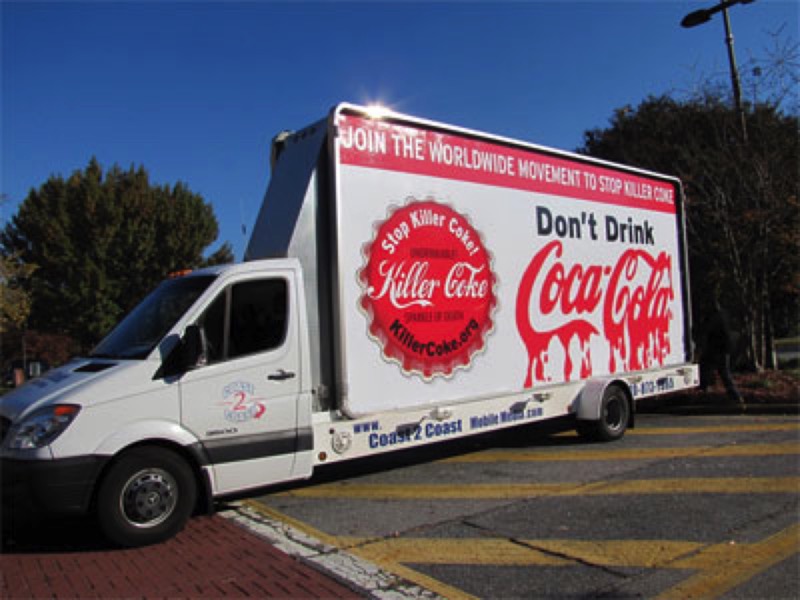
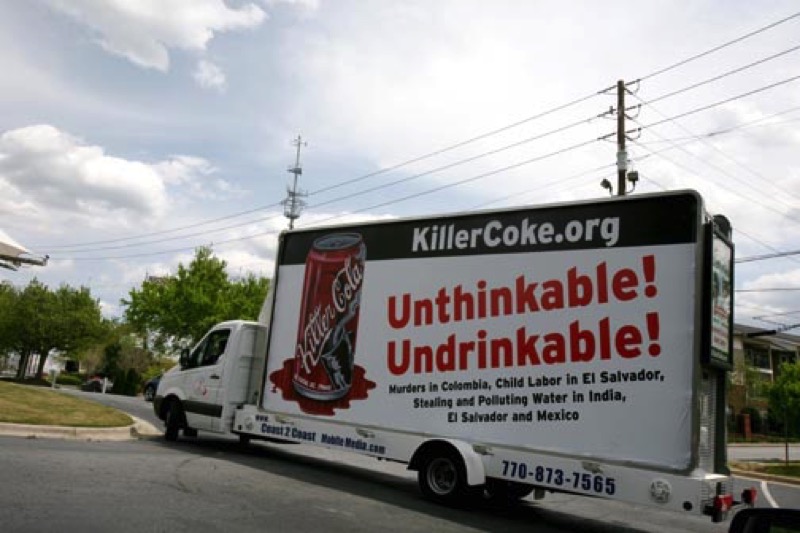
The Campaign to Stop Killer Coke Movement Erupts at last year's SOA Protest!
Watch on YouTube
The film showing of "The Coca-Cola Case" during the SOA 2010 protest
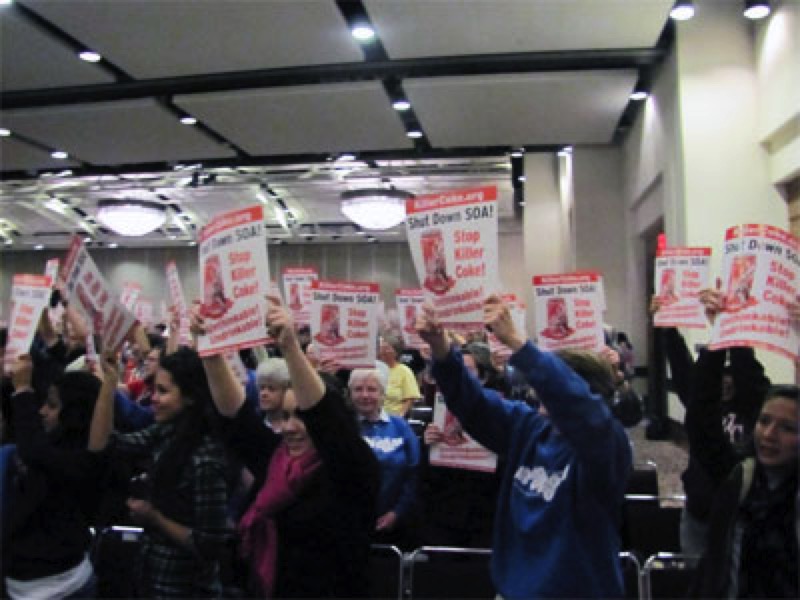
This year the Campaign to Stop Killer Coke will be hosting a 90-minute workshop on Saturday, Nov. 19, at 9 pm in Room #213 in the Columbus Convention Center.
As in recent years, we are looking to distribute thousands of pieces of literature and "Stop Killer Coke, Shut Down SOA" posters. We will have two tables in the Convention Center and we'd appreciate you dropping by. We can use help in distributing our Stop Killer Coke literature to every participant at the conference. Please contact us beforehand mailto:(info@KillerCoke.org) or see us at our tables at the conference center if you are able to join us.
The Campaign to Stop Killer Coke supports the School of the Americas Watch and we urge our sisters and brothers to visit SOAW.org.
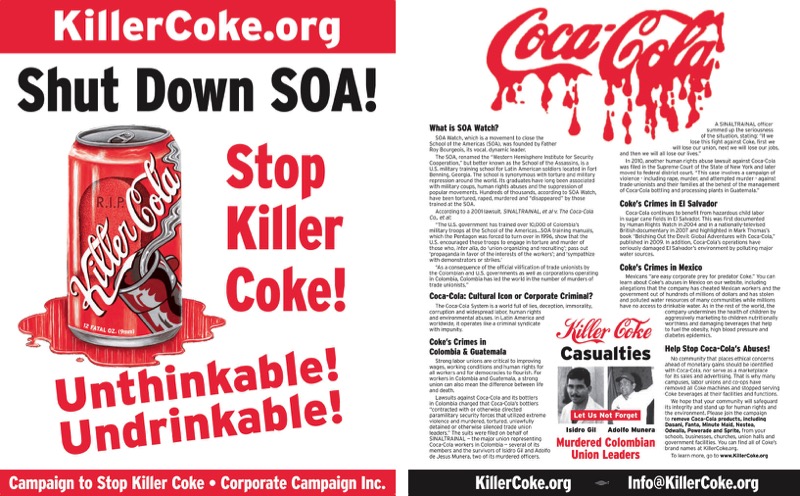
Download the brochure in .PDF
3. Coke with Koch. Surprised?
"What is Coca-Cola doing behind closed doors with Koch Industries and other multinational corporations in the American Legislative Exchange Council (ALEC)?" asks The Center for Media and Democracy, which recently made note of ties between The Coca-Cola Co. and the ultra-right wing, Koch-backed American Legislative Exchange Council. Coca-Cola Refreshments' Director of Public Affairs and Communications, Gene Rackley , represents Coke on ALEC's "Private Enterprise" Board, along with Koch Industries ' Michael Morgan .
Coca-Cola Refreshments Inc., is The Coca-Cola Company's bottling and customer service operation in both the U.S. and Canada.
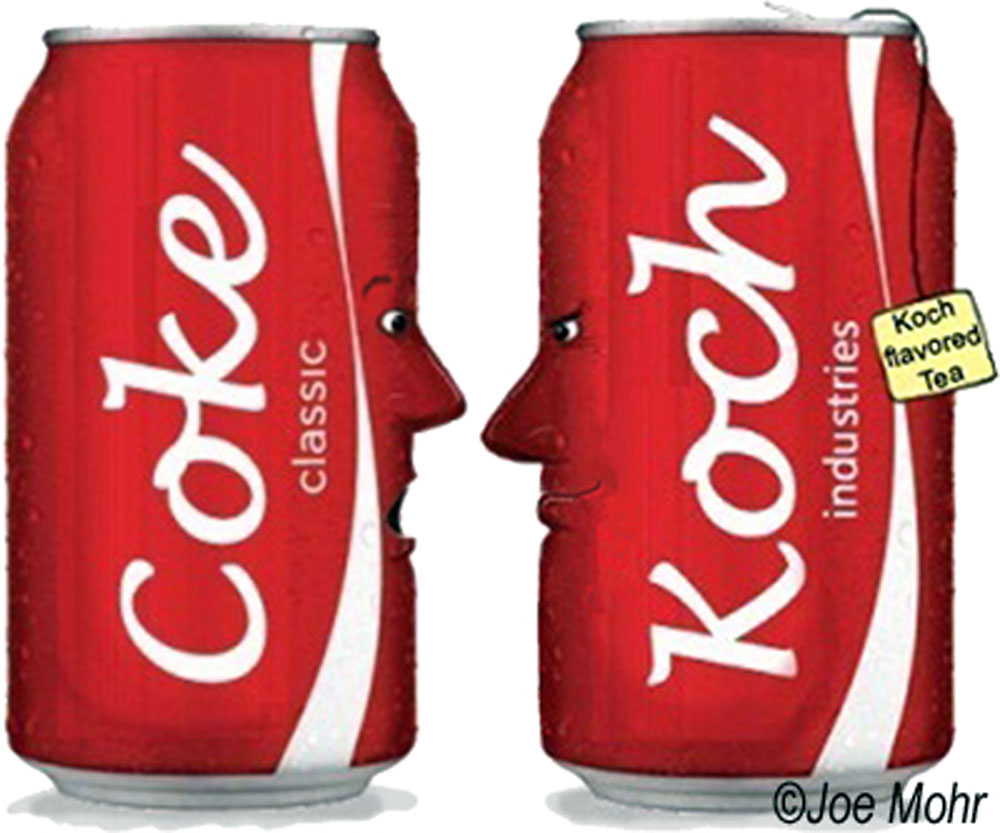
What is Coke doing with Koch?
(Photo by Joe Mohr)
The articles below discuss the relationship between ALEC and Coke and explain what ALEC is:
a. "ALEC and Coca-Cola: A "Classic" Collaboration", PRWatch, Submitted by Rebekah Wilce on October 12, 2011
Read Article"Coke and ALEC have a lot in common. Both love free trade and have been big boosters of free trade agreements, such as the Korea, Panama and Colombia agreements facing votes this week in Congress. Both are dubious about recycling, especially taxes applied to industry to pay for mandatory recycling. But in one area, ALEC policy benefits Coke and other sweet drink makers directly..."
b. "Inside the ALEC Dating Service" The Progressive, By Mark Pocan, October 2011
Read Article"...ALEC is a corporate-funded and-dominated group that operates much like a dating service, only between legislators and special interests. It matches them up, builds relationships, culminates with the birth of special interest legislation..."
"Half of the organization is made up of legislators, mostly conservative Republicans. There is a smattering of conservative Democrats, a handful of people of color... The other half is comprised of corporate special interests. They pay big bucks to put their logos, lobbyists, and legislation in front of the objects of their affection: state legislators."
4. Coca-Cola targets black and Hispanic children with toxic beverages
A recent report by the Yale University Rudd Center for Food Policy & Obesity found The Coca-Cola Co. has been targeting black and Hispanic children. The New York Daily News and the International Business Times reported on the study.
The Daily News reported the following:
According to the report, released by the Yale University Rudd Center for Food Policy & Obesity, black kids and teens watched 80% to 90% more ads than white children.
Hispanic teens were exposed to 99% more ads than their white counterparts.
"Our children are being assaulted by these drinks that are high in sugar and low in nutrition," said Kelly Brownell , co-author of the report. "The companies are marketing them in highly aggressive ways."
The Dr. Pepper Snapple Group was also singled out for targeting young children. As the Campaign to Stop Killer Coke reported last year, Coca-Cola paid $715 million to become a mass distributor of Dr. Pepper/Snapple.
In contrast to Coca-Cola's targeting of young children, The International Business Times pointed out that PepsiCo "decreased television advertising by 22 percent."
The Campaign to Stop Killer Coke strongly condemns Coca-Cola's exploitative and harmful practices and welcomes all to join the worldwide movement to Stop Killer Coke.
For more information on the relationship between Coca-Cola and Dr. Pepper/Snapple, please visit KillerCoke.org Dr Pepper
Soft drink makers like Coca-Cola and Dr Pepper Snapple Group target black and Hispanic teens, children: report:
"Big brands are capitalizing on minority youth to be their biggest buyers with multimedia campaigns in addition to traditional print, TV ads" by Joyce Chen, New York Daily News, November 1, 2011
Read Article
"Coca-Cola, Soft-Drink Companies' Advertising to U.S. Children, Teens on the Rise: Study" by Brett LoGiurato | October 31, 2011, International Business Times
Read Article
5. Coke's Money Stops Environmental Protection
"Parks Chief Blocked Plan for Grand Canyon Bottle Ban" By Felicity Barringer, The New York Times, November 9, 2011
Read Article
"Weary of plastic litter, Grand Canyon National Park officials were in the final stages of imposing a ban on the sale of disposable water bottles in the Grand Canyon late last year when the nation's parks chief abruptly blocked the plan after conversations with Coca-Cola, a major donor to the National Park Foundation...
"Mr. [Stephen P.] Martin, a 35-year veteran of the park service who had risen to the No. 2 post in 2003, was disheartened by the outcome. 'That was upsetting news because of what I felt were ethical issues surrounding the idea of being influenced unduly by business,' Mr. Martin said in an interview."
6. Supreme Court to decide whether corporations can be sued in U.S. courts for human rights abuses abroad
Ruling Would Decide Fate of Cases Brought against Corporations under Alien Tort Statute
By CCI Staff
The U.S. Supreme Court announced on Oct. 17 that it would hear a case that could decide the question of whether corporations can be held accountable for human rights abuses committed with their aid in foreign countries.
The case--Kiobel v. Royal Dutch Petroleum NV--will allow the Court to address the 222-year old Alien Tort Statute (ATS), a law passed by the very first U.S. Congress in 1789. The ATS allows foreign citizens to file lawsuits against any entity under U.S. governance--citizens, non-citizen residents, corporations--for alleged violations of international law, including human rights abuses, even if those abuses did not occur on U.S. soil.
While the question of whether corporations can be held liable under the ATS has been the subject of legal debate, some corporations--including Exxon Mobil Corp., Chevron Corp., Yahoo! Inc., Bridgestone Corp., and of course, The Coca-Cola Co.--have all been sued under the ATS to varying degrees of success.
Unlike any current ATS cases still winding their way through the federal court system, several lawyers noted that it's unlikely that any dismissed ATS case--even if it was dismissed for lack of jurisdiction reasons--would be re-filed if indeed the Supreme Court allows for corporate liability under the ATS.
The Supreme Court will begin hearing oral arguments in Kiobel early in 2012, with a decision expected by the end of June.
History of the ATS
The ATS was part of the Judiciary Act of 1789, and was intended to assure foreign governments that the fledgling United States would act to prevent violations of customary international law and offer remedy to those wronged. Though there is little known of the legislative history of the creation of the ATS, it has been surmised by legal scholars that it was enacted in response to several international incidents in which foreign citizens living in the U.S. had no legal remedy for acts committed against them.
Most famous of these incidents was the assault of French diplomat Francois Barbe-Marbois in 1784. Barbe-Marbois learned he had no legal standing in U.S. courts, prompting Congress to request that individual states allow for lawsuits brought by such foreign citizens claiming violation of international law. However, after only a few states enacted such a provision, Congress created the ATS.
Despite its potentially weighty matter, the ATS gathered dust for almost two centuries, being cited and used only in the rarest of instances. In 1980, all that changed when the U.S. Court of Appeals for the Second Circuit (covering the states of Connecticut, New York and Vermont) decided Filartiga v. Pena-Irala and revolutionized how the ATS was used. Since 1980, dozens of ATS claims have been brought, with many of them being dismissed by the courts. To date, there have been only two successful ATS claims against a corporation--one by jury verdict and one entered by default--according to a legal database that tracks such cases.
The ATS & SINALTRAINAL v. Coca-Cola Co.
One of the more notable ATS cases is SINALTRAINAL v. Coca-Cola Co., which was brought in 2001 on behalf of SINALTRAINAL--the major labor union representing Coca-Cola bottling workers in Colombia--and included as plaintiffs several union members falsely accused of crimes by Coca-Cola managers and imprisoned for six months, and the survivors of two murdered union officers, Isidro Gil and Adolfo de Jesus Munera.
The SINALTRAINAL lawsuit charged Coca-Cola bottlers in Colombia with the systematic intimidation, kidnapping, torture and murder of union leaders in efforts to crush their union. Seven union leaders and a friendly plant manager who was also a member of the union were murdered between 1990 and 2002. Family members of union leaders have been kidnapped, tortured and murdered as well, with three family members of one union leader murdered in 2004. The lawsuit charged that Coca-Cola bottlers in Colombia "contracted with or otherwise directed paramilitary security forces that utilized extreme violence and murdered, tortured, unlawfully detained or otherwise silence trade union leaders."
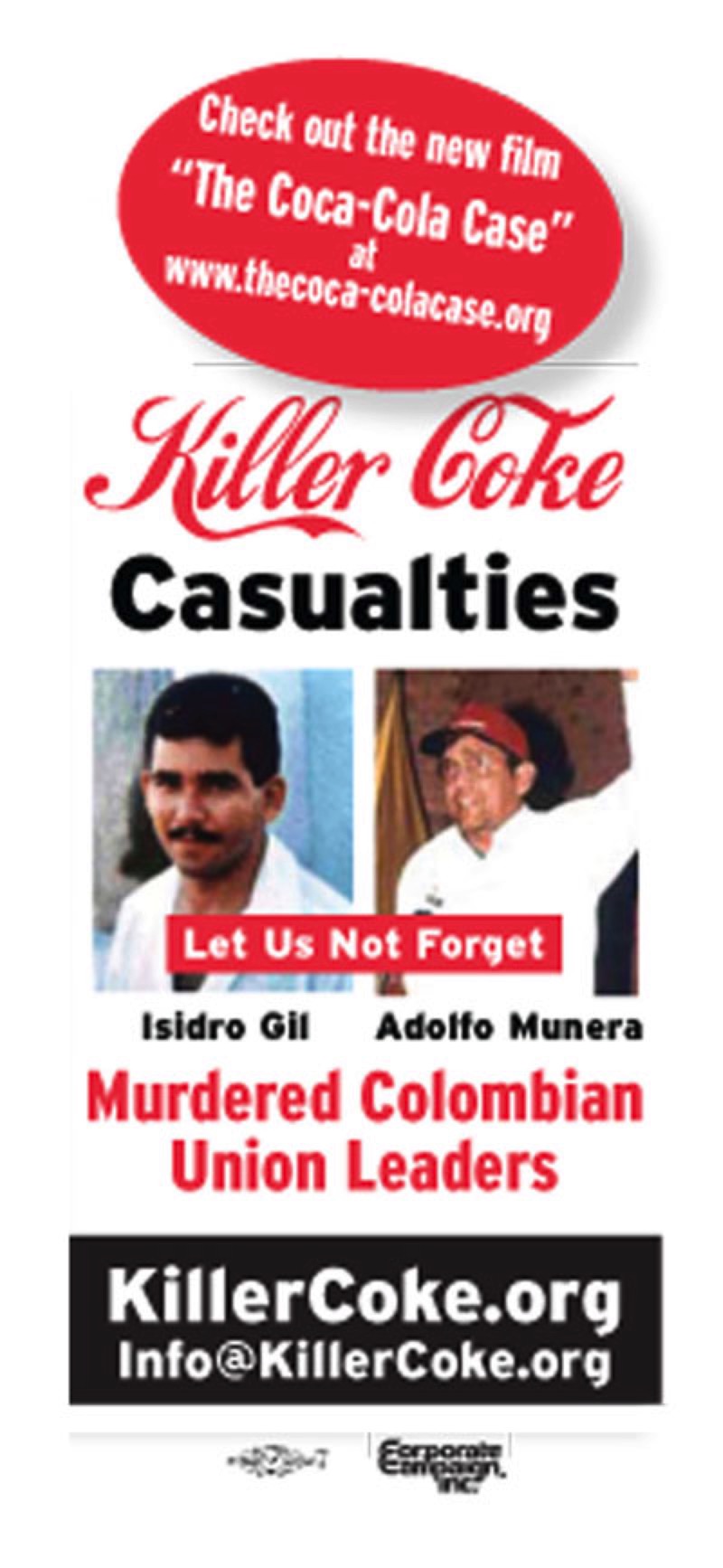
The Campaign to Stop Killer Coke was initiated in 2003 after the two attorneys representing the plaintiffs in SINALTRAINAL, Terry Collingsworth and Dan Kovalik, contacted Corporate Campaign, Inc. and its director, Ray Rogers, to organize a campaign to draw attention to Coca-Cola's pattern of human rights abuses in Colombia.
A Florida district court dismissed SINALTRAINAL in 2006, citing that U.S. federal courts had no jurisdiction under the ATS in this case. In 2009, the Eleventh Circuit Court (covering Florida, Georgia and Alabama) upheld the dismissal, citing also lack of jurisdiction, but adding a twist by citing a recently decided Supreme Court case, Ashcroft v. Iqbal. Under Iqbal, decided in May 2009, the Supreme Court invoked a greatly heightened standard of pleading, requiring that plaintiffs' claims have "facial plausibility" to survive dismissal. The Court explained in its Iqbal ruling that facial plausibility means the facts as stated allow courts "to draw the reasonable inference that the defendant is liable". Obviously, such a definition--ripe with subjective terms like "reasonable inference"--has given great leeway to lower courts to dismiss plaintiffs' claims on their face and often, very early on in the proceedings.
Given that hurdle, attorney Kovalik said it would not be possible to re-file the SINALTRAINAL case even if the Supreme Court finds in Kiobel that corporations are liable under the ATS. "The Coca-Cola case was lost chiefly because the court found that, even if our allegations were taken as true, the defendants could not be tied closely enough to the human rights abuses alleged to hold them liable," Kovalik said. "Of course, we disagree with this, but the Supreme Court's decision in Kiobel would not change this outcome." [See information about key judge, Jose Martinez's, conflicts of interest.]
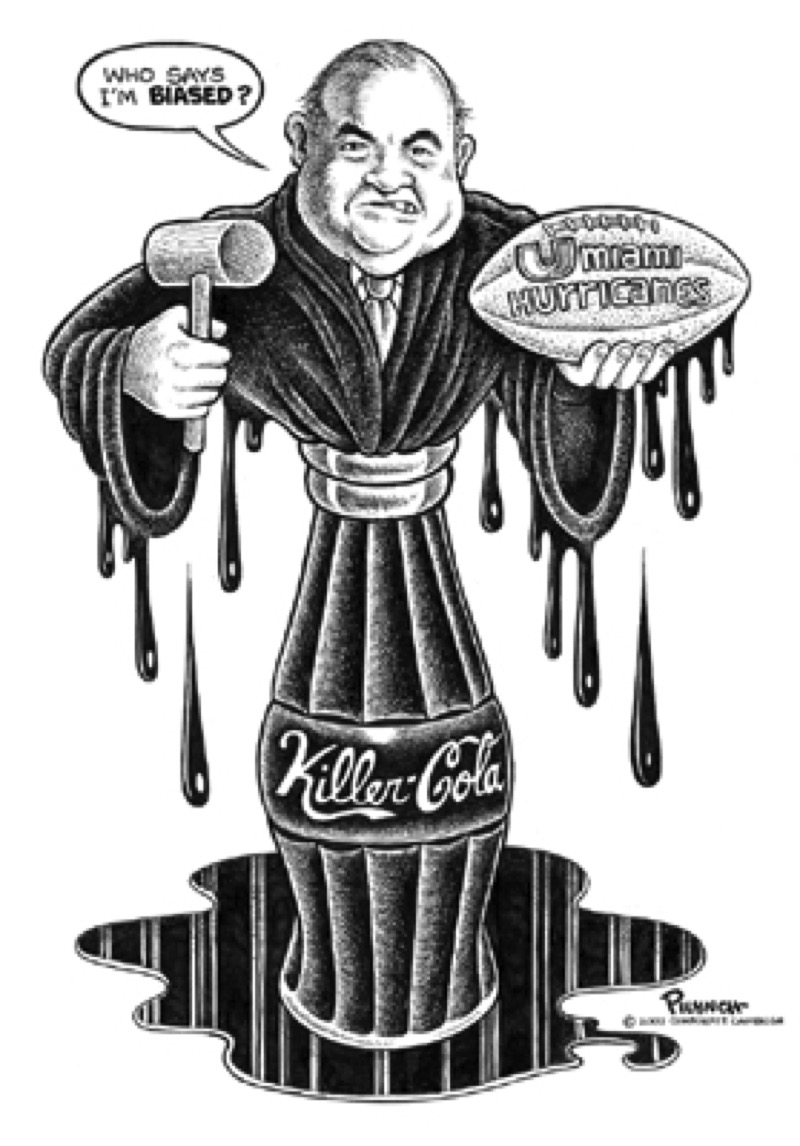
The Supreme Court & the Kiobel Case
Kiobel v. Royal Dutch Petroleum — the case now before the Supreme Court--involves a lawsuit against Shell Oil (now part of Royal Dutch Petroleum) that was brought under the ATS by a group of Nigerian citizens who claimed the oil company was complicit in massive human-rights abuses in the early- and mid-1990s. The plaintiffs allege that Shell Oil subsidiaries enlisted the help of the repressive Nigerian government to shut down opposition to oil exploration in the region. The situation received worldwide attention in 1995 when several activists were executed by the Nigerian government after hastily-run military trials.
The Kiobel case was heard by a federal district court in 2006, which dismissed many of the plaintiffs' claims, refused to dismiss others, and turned the whole case over to the Second Circuit Court because of the seriousness of the charges.
In September 2010, the Second Circuit tossed out the Kiobel lawsuit, ruling that corporations can't be sued under the ATS, and refusing to recognize corporate liability for international crimes. In reaching its decision, the Second Circuit cited the previous 30 years of both Supreme Court and Second Circuit precedential rulings, stating that under those rulings, "corporate liability is not a discernible--much less a universally recognized--norm of customary international law."
The Second Circuit's dismissal of Kiobel points up a sharp split among the 13 Circuit Courts of Appeal, with only the Second Circuit arguing that corporations face no liability under the ATS.
Indeed, just eight days after the Supreme Court agreed to hear Kiobel, the Ninth Circuit Court (covering much of the Western U.S., including Alaska and Hawaii) ruled in Sarei v. Rio Tinto that corporations were in fact liable for violations of international law, such as human rights abuses or war crimes.
In addition to the Ninth Circuit Court's ruling, the liability of corporations under the ATS was upheld twice this year, by the Seventh Circuit Court (Illinois, Indiana and Wisconsin) in Flomo v. Firestone Nat. Rubber Co., LLC; and then by the D.C. Circuit Court in Doe VIII v. Exxon Mobil Corp.
Seeming to draw a line in the sand with the Second Circuit Court, the D.C. Circuit Court wrote in its Doe ruling that "neither the text, history, nor purpose of the ATS supports corporate immunity for torts based on heinous conduct allegedly committed by its agents in violation of the law of nations."
Given this split, it is little surprise that the Supreme Court feels it's imperative that it give the final word on whether corporations face liability under the ATS.
7. Unhealthy Issues
a. 12 California Students Named 'Soda Sucks' Competition Winners
Youth Leaders Encourage Peers to Fight Back Against Predatory Soda Marketing
October 18, 2011
Read Article
"Soda giant Coca-Cola may have reported $12.2 billion in quarterly revenue this morning, but at least 12 California young people say they aren't buying. The dozen youths, who were named winners of the 'Soda Sucks' competition sponsored by New American Media, are instead using their talents to inspire teens across the state to reject unhealthy sugary sodas and drink water instead...
"In his winning video entry, William Haynes, a 17 year-old from Hercules...Haynes outlined the latest research about the connection between soda consumption and diabetes, obesity, and tooth decay...
The site for "Why Soda Sucks": www.whysodasucks.org
The site for KillerCoke.org's health section: www.killercoke.org/health_issues.php
b. "Africa struggles to control prolific killer" by Katrina Manson, Financial Times, September 17-18, 2011
Read Article
"Diabetes — Death toll from the disease is expected to rise above those of malaria and HIV by 2030, writes Katrina Manson...
"The World Health Organisation says unhealthy diets, smoking, drinking and inactivity are factors in developing NCDs [noncommunicable diseases]...
"...it is a bitter corollary to development as urbanisation takes hold even in rural areas. Some blame the 'CocaColaisation' of Kenyan society. Billboards showcase bottles of the sugary drink with the slogan 'Open happiness'.
" 'We have an increasingly sedentary lifestyle, everybody is drinking sodas and eating starch and fried fatty snacks in school,' says Dr. Acharya, chairman of the Diabetes Kenya Association, who says the disease in children is increasing.
"The Kenyan government, which has already restricted public smoking and alcohol consumption, is considering banning adverts for sugary food and drinks near schools and requiring salt and sugar food labelling."
c. "The Diet-Soda Dilemma: Can zero-calorie drinks make you gain weight?" - AARP The Magazine, Sept./Oct. 2011
Read Article in .PDF
"...researchers tracked 474 older adults for nearly a decade and found that the waistlines of diet-soda drinkers expanded 178 percent more than those of people who avoided these drinks. In fact, those who drank two or more diet sodas daily saw their waistlines expand by an average of 4.7 centimeters (about 2 inches)."
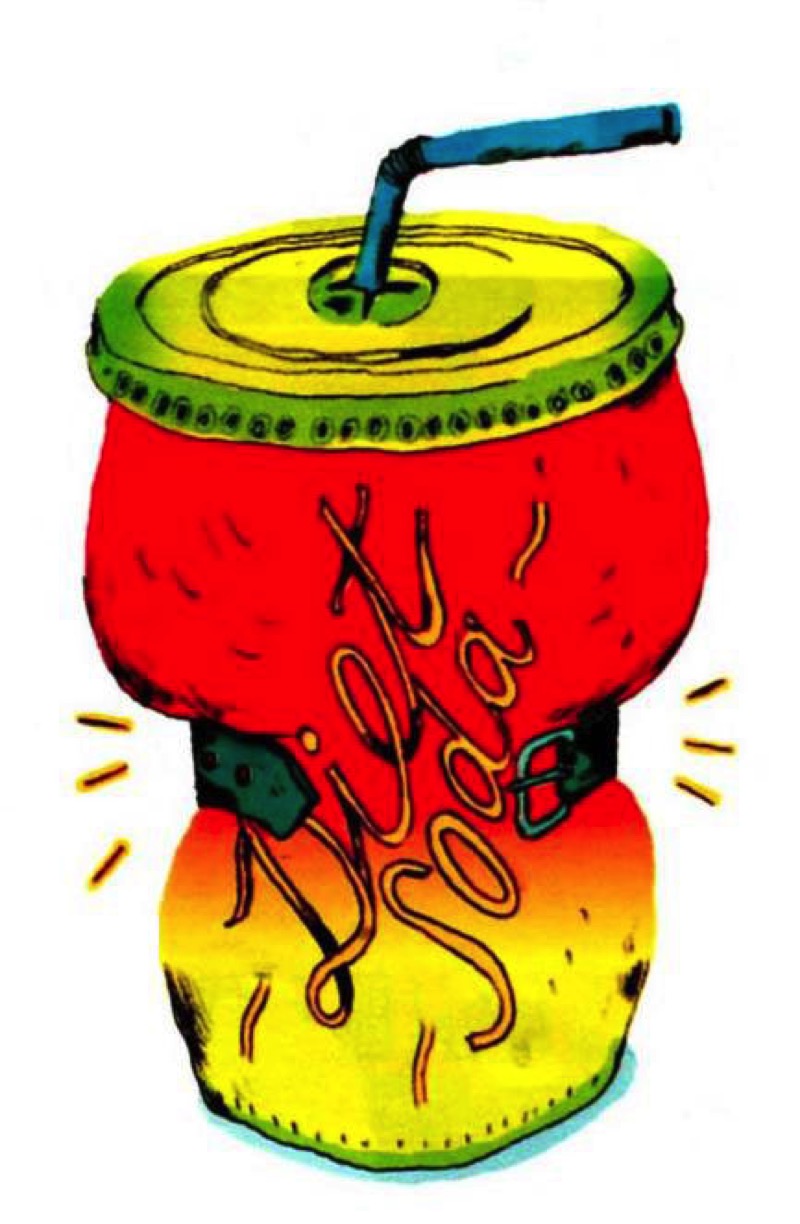
d. "Addicted To Coke . . . And Suing Coca-Cola?" by Joe Palazzolo, November 3, 2011, The Wall Street Journal
Read Article
"There is a growing body of medical research that processed foods and sugary drinks can affect the brain in ways that resemble addictions to cocaine, nicotine and other drugs. If fatty foods and snacks are proven to be addictive, food companies could be looking at the biggest consumer-safety battle since the Tobacco Wars, according to Bloomberg."
e. "Fatty Foods Addictive Like Cocaine in Growing Body of Scientific Research" By Robert Langreth and Duane D. Stanford - November 2, 2011, Bloomberg
Read Article
"A growing body of medical research at leading universities and government laboratories suggests that processed foods and sugary drinks made by the likes of PepsiCo Inc. and Kraft Foods Inc. (KFT) aren't simply unhealthy. They can hijack the brain in ways that resemble addictions to cocaine, nicotine and other drugs.
" 'The data is so overwhelming the field has to accept it,' said Nora Volkow, director of the National Institute on Drug Abuse. 'We are finding tremendous overlap between drugs in the brain and food in the brain.' "
8. Campaign to Stop Killer Coke joins Occupy Wall Street Movement
On October 5th, members of the Campaign to Stop Killer Coke joined thousands of others in the Occupy Wall Street march and rally. The Campaign strongly supports the challenging of corporate crimes and corporate greed and an end to corporate welfare. We continue to be active in the Occupy Wall Street movement and urge everyone to support their local "Occupy" movement.
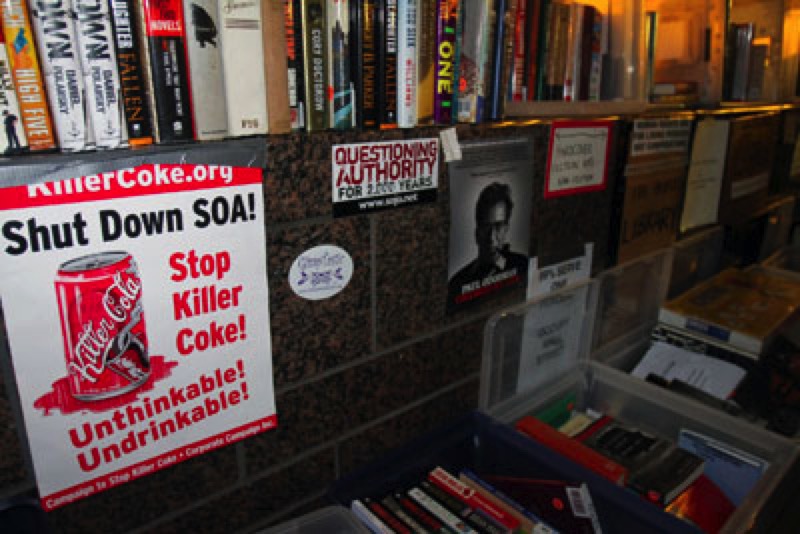
Stop Killer Coke poster at the People's Library,
Occupy Wall Street, Zuccotti Park
(Photo by Nancy Siesel)
Thousands of Stop Killer Coke flyers have been distributed at Foley Square and Zuccotti Park in New York and the Stop Killer Coke posters have been a huge hit. For more information visit: www.occupywallst.org.
9. New Stop Killer Coke T-Shirts have arrived!
New Killer Coke T-Shirts are here. For a donation of $25 you will receive a 100% union-made, No Sweat, T-Shirt. The new T-Shirts are not only comfortable, but will send a strong message to all who see them that you are a supporter of human rights, labor rights and the environment and not a drinker of Killer Coke.
Please visit the Campaign Store to check out the new T-Shirts as well as Stop Killer Coke buttons and "The Coca-Cola Case."
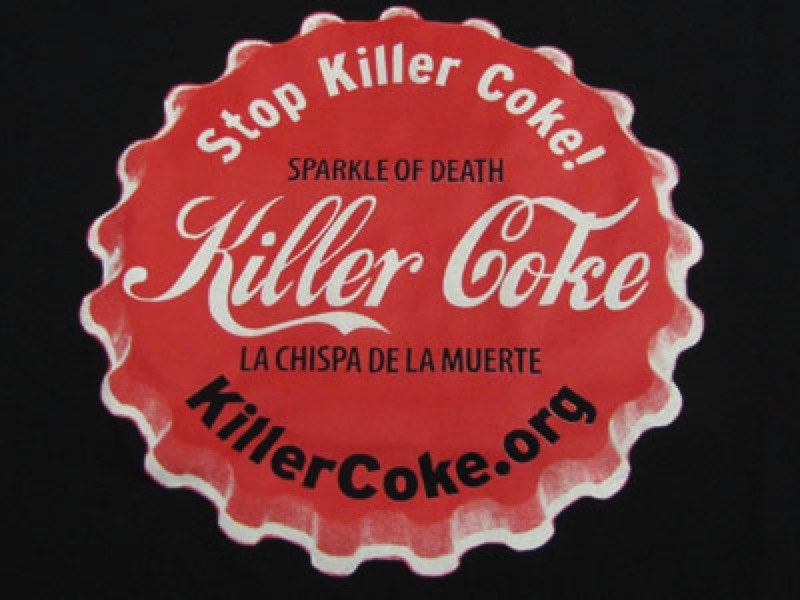
10. Corporate Campaign, Inc. has a new website. Check it out!
Corporate Campaign, Inc., the founder of the Campaign to Stop Killer Coke, has reorganized its website at CorporateCampaign.org.











